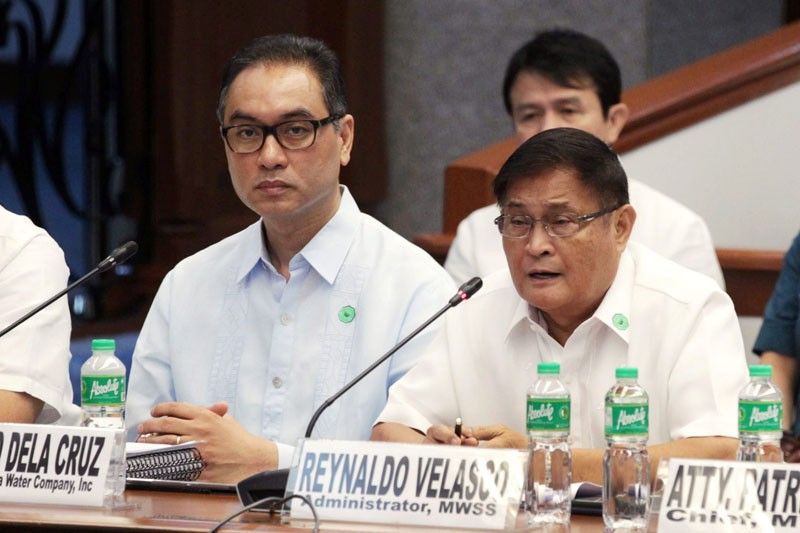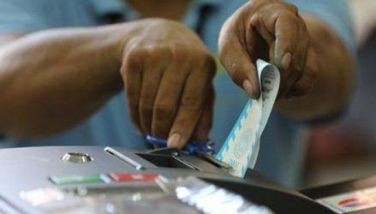Duterte summons MWSS officials over water shortage

MANILA, Philippines — President Duterte and water regulators were set to meet last night to discuss the water crisis that Malacañang has blamed on mismanagement.
Duterte and officials of the Metropolitan Waterworks and Sewerage System (MWSS) were scheduled to meet at 6:30 p.m., according to presidential spokesman Salvador Panelo.
“Perhaps the MWSS will explain,” Panelo said. “Perhaps they will report latest developments. Perhaps they will report to (the President) on how they complied with his directive.”
Duterte had ordered the MWSS to compel water utilities and offices involved in water management to deliver enough water to affected households and to release water from Angat Dam to address supply issues.
Lawmakers have initiated an investigation into the water supply shortage.
At the Senate inquiry yesterday, senators as well as affected residents said Manila Water Company Inc. should be held accountable for the water shortage that hit areas handled by the private east zone concessionaire.
The MWSS said it is mulling penalties against Manila Water for the unexpected water shortage under its concession in many parts of Metro Manila and Rizal province.
It was a reversal of the MWSS’ statement the other day that Manila Water could not be sanctioned for the water shortage.
MWSS Regulatory Office chief Patrick Ty told the committee on public services, chaired by Sen. Grace Poe, that the agency can invoke Article 10, Section 10.4 of the government’s concession agreement with Manila Water that provides penalties for failure to fulfill obligations – providing water – for 15 days.
“There’s no prohibition from doing it (imposing penalties) now. We’re studying it right now, we’re exploring our options for June or July,” Ty told the Senate hearing.
He explained the 15-day period stated in the section where a private concessionaire’s failure to fulfill its obligations that it was already affecting public health and welfare has yet to lapse as MWSS formally wrote them on the matter last March 8, which is the start of the countdown.
All indications, however, point to water interruptions continuing beyond 15 days after Manila Water president Ferdinand de la Cruz admitted to the committee the full service may be restored only by June based on the company’s plan.
Ty explained the normal course of action is to impose penalties during the time when the MWSS and the private water concessionaires conduct rate rebasing, which is done every five years.
The next such review for new water rates is on 2022. He said the penalties are usually in the form of the MWSS disallowing certain expenses that concessionaires want to charge to their customers.
“We want to focus on fixing things first…normally we would wait, but this (water shortage) is unprecedented,” Ty said.
Negros Occidental Rep. Albee Benitez, chairman of the committee on housing and urban development in the House of Representatives, said the millions of customers deprived of water for days in Metro Manila can file a class suit against Manila Water.
“Manila Water admitted violations, so there is negligence on their part and proper compensation to their costumers should follow,” Benitez said, referring to the previous hearing of the House on the issue.
“Every time these consumers fail to settle their monthly bills, their water supply is cut automatically,” Benitez lamented. “There should be proper compensation for their customers. Because if nothing, we (lawmakers) will be obliged to encourage a class action suit.”
Mandaluyong Rep. Alexandria Gonzales, whose congressional district bore the brunt of the water shortage, said the service provider “should seriously consider offering a rebate or a discount at the very least in the water bills of residents for the month of March.”
“I think that this is a fair enough compensation for Manila Water’s customers for their inefficiency that has caused a lot of unnecessary suffering and discomfort in the lives of the people in Mandaluyong,” she said.
Marikina City Rep. Bayani Fernando supported Benitez’s call.
“Manila Water should not be given new franchises anymore until they have done their work. I think they have put too much focus on their profits, more than their mandate. Let’s set aside too much greed,” he said.
Bayan Muna party-list group said the MWSS should compel Manila Water and Maynilad to reduce their “non-revenue water,” a euphemism for water lost through pilferage and distribution leakages.
“What is glossed over by the regulator is that billions of gallons of water is wasted daily from leakages in the existing distribution infrastructure of Maynilad and Manila Water,” the group said.
Quezon City Rep. Winston Castelo also said Manila Water should slash the next billing amount for customers hit by the shortage, which affected roughly 1.2 million households.
MWSS administrator Reynaldo Velasco echoed the same sentiment but maintained that the decision is up to Manila Water.
Manila Water, on the other hand, said it has yet to decide on the matter, including the call for refund for its consumers.
“All decisions would come from MWSS-Regulatory Office,” Manila Water communications manager Dittie Galang said.
Restoration
After continuous interruptions, Manila Water has restored supply in about 93 percent of its concession area for almost two weeks.
Manila Water said its customers now have longer hours of water availability daily as compared to last week.
After implementing the rotational water supply scheme that began on March 14, latest data showed that 93 percent of Metro Manila’s east zone now regularly receives water supply.
Most of Manila Water’s customers are now receiving better service, particularly in barangays San Isidro, San Jose, San Luis and San Roque in Antipolo who are now getting an additional seven hours of water supply daily.
Barangays Bambang and Wawa in Taguig are also getting more hours of supply.
However, portions of Barangay Pasong Tamo in Quezon City, Barangay Pulo in Mandaluyong, Gitnang Bayan in San Mateo and Bagong Ilog in Pasig are still experiencing unstable water supply.
The same goes for Upper Forbes in Makati, San Martin de Porres in Parañaque and Raha Sumakwil in Taguig.
“There are still some technical solutions that are being put in place,” Galang said.
Meanwhile, tankering services continue to be deployed to the remaining seven out of the 11 barangays where water supply through the network has yet to be restored.
The rotational service scheme adopted is a temporary measure that aims to balance water supply distribution.
In the past days, Manila Water has been making calibrations in its network distribution that has resulted in the continuous improvement of water restoration.
Find more sources
Finance Secretary Carlos Dominguez III said the water crisis would have been “much less of a threat” if the Kaliwa Dam were built during previous administrations. The dam will be funded through official development assistance from China and will be built by China Energy Engineering Corp.
But environment groups and local officials are opposed to the construction of the dam, saying it would cause floods, displace residents and destroy Sierra Madre’s biodiversity.
Panelo said the administration could stop the Kaliwa Dam project if it is fraught with anomalies.
“It will push through until perhaps anomalies are discovered,” he said.
“Of course, the President can stop anything, unless there is a contract already. There might be impairment of obligations in the contract. But it can be (stopped) if there was fraud in entering it,” he added.
Panelo, also the President’s chief legal counsel, said the project would be implemented “unless it’s stopped by the President.” He said it would be up to Duterte to decide whether to reevaluate the deal with China.
“We will leave it to his judgment call. But if you ask me personally, if the advantage is so clear, if it is true that the Chinese proposal is onerous, I think we should look into it,” Panelo added.
Panelo said he would ask the National Economic and Development Authority why it preferred the Chinese deal over the proposal by Japanese firm Global Utility Development Corp. The Japanese firm has expressed readiness to build the Kaliwa Dam under a 25-year build-operate-transfer scheme. Its proposal costs about $410 million.
Sen. Joseph Victor “JV” Ejercito urged the government to find more water sources to prevent water crisis.
Ejercito pointed out that Metro Manila has only two sources of water – Angat and La Mesa Dams – which were built in 1960s. The population of the metropolis has since increased threefold.
Ejercito said Manila Water should have forewarned the public about the water crisis to allow them to prepare and make the necessary preparation to minimize their inconvenience. – With Paolo Romero, Delon Porcalla, Louise Maureen Simeon, Jess Diaz, Cecille Suerte Felipe, Rhodina Villanueva
- Latest
- Trending




























